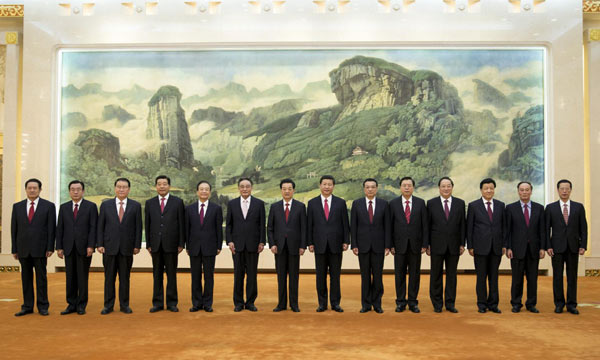More efforts urged to protect migrants
By He Dan and Chen Xin (chinadaily.com.cn)
Updated: 2012-11-12 04:25
The two growing headaches for China's huge migrant working population are the inadequate social security and payment for working overtime, a Party congress delegate who is a lawyer said on Sunday.
A government crackdown in recent years has helped reduce cases of employers defaulting on wages, something that has plagued the 250 million farmers-turned workers, Tong Lihua, who provides legal aid to the migrant population, said on the sidelines of the 18th Party Congress.
"We handled lots of cases of migrant workers seeking overdue wages when we opened a center to help them in 2005," said Tong, director of Beijing Zhicheng Migrant Workers Legal Aid and Research Center.
 |
|
A migrant worker salutes government officials after he and 76 others received a total of 2.5 million yuan ($400,000) in overdue wages, thanks to the help of labor supervisors in Chaoyang, Liaoning province, this year. LI SONGJUAN / XINHUA |
But since 2007, the government has worked to protect migrant workers' rights and interests, and wage defaults have dropped significantly, he said.
The center receives 6,000 to 8,000 phone calls a year from migrant workers, and the number of consultations about wage defaults is steadily falling, he said.
But there are increasing cases nowadays of employers who do not live up to their social insurance obligations or provide insufficient overtime pay, and more migrant workers are suing to defend these rights, Tong said.
By law, employers must provide five sorts of social insurance —including work-related injury insurance — for contracted employees, and employees must be paid at least double wages for overtime.
But some employers have failed to stay apprised of their legal responsibilities, Tong said.
Tong urged the government to create more channels for migrant workers to voice their concerns and complaints and to ensure they can defend their rights.
The government must strive to ensure that migrant workers have more equal access to public services and social welfare, and it must simultaneously reduce the development gap between urban and rural areas so that more of the rural population can find work opportunities at home, Tong said.
Zhang Jun, an independent labor rights activist in Yantai, Shandong province, said the most frequent infringements of migrant workers' rights are a failure to compensate for workplace injuries and unpaid wages.
Workers who claim to have been injured on the job have to follow a legal and medical process, Zhang said.
Under law, they must provide reams of documentation, including proof of employment and medical records, before they can apply for compensation.
"Many workers can't wait that long for the compensation so they just agree on a small amount of money from their employers and go back to their hometowns," he said.
Zhang said he dealt with a case where it took nearly two years for a worker in Yantai to get his compensation because he had not signed a labor contract with the employer.
Without a contract, it's hard to prove the employment relationship, and the employer also has rights to contest and delay lawsuits, he said.
Only 33 percent of construction workers have labor contracts with employers, and 78 percent of those do not have a copy of the contract, a recent survey by Beijing Normal University's China Labor Studies Center found.
Under law, employers must pay work-related injury insurance for employees, and if they do not, they are held responsible for injured employees' medical care and compensation.
"Wage delays are very common on construction sites, and some contractors even vanish after a project is finished, skipping out on paying the workers," Zhang said.
In the construction industry, investors hire a contractor, who usually parcels out work to subcontractors, who also may use any number of subcontractors.
Most construction workers find work through acquaintances, and they worry they might lose the job by asking the employer for a contract.
Ye Jingyi, a labor law professor at Peking University, said labor authorities must tighten law enforcement and ensure that workers sign contracts with employers.
"Workers need to get a better understanding of their legal rights in the workplace and what to do if they are denied their rights," she said.
"Labor authorities must punish employers who do not sign contracts with workers or violate other labor laws."
Contact the writers at hedan@chinadaily.com.cn and chenxin1@chinadaily.com.cn
Related Stories
Young migrant workers optimistic about city life 2012-11-08 16:58
Migrant workers have their voices heard 2012-11-07 19:20
Migrant worker group ready for first congress 2012-11-06 11:29
China to prevent wage defaults for migrant workers 2012-10-26 11:02
Equality urged for migrant workers 2012-09-13 07:48
IQ tests for migrant workers' kids 2012-09-08 14:00
Migrant workers' kids say goodbye till next year 2012-09-01 07:57

Top News
Xi emphasizes adherence to CPC Congress spirit
Top legislator urges implementation of congress spirit
Moderately prosperous China brings chances to world
Video







